Welcome to the verdant world of eco-friendly gardening, where your backyard can become a thriving, sustainable oasis. Whether you’re a seasoned green thumb or just starting to dabble in dirt, there’s a bounty of simple, impactful practices awaiting you that will nurture both your plants and the environment. As we become more conscious of our ecological footprint, adapting our gardening habits to be more sustainable is a powerful step toward a healthier planet.
In this article, you’ll discover a treasure trove of eco-friendly techniques that blend seamlessly with your gardening routine. From composting kitchen scraps to conserving water, these practices not only benefit the earth but also enhance the vitality of your garden. Prepare to explore innovative methods that invite nature’s allies, like pollinators and beneficial insects, into your garden sanctuary. Together, let’s embark on a journey to create lush, green spaces that harmonize with nature’s rhythms and inspire a more sustainable way of living.
Choosing Sustainable Garden Materials
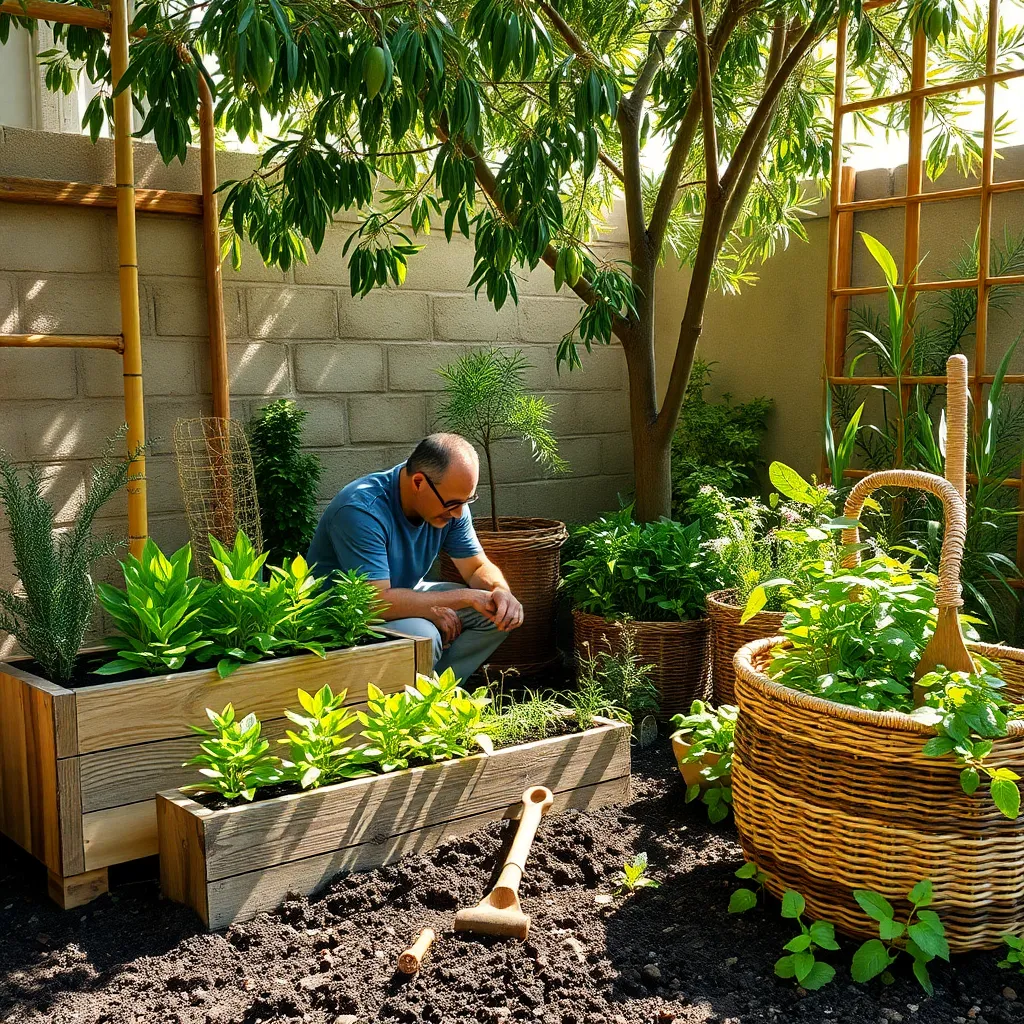
When choosing materials for your garden, opt for those that are locally sourced and sustainably produced. This not only reduces your carbon footprint but also supports local businesses and ensures that your garden maintains a low environmental impact.
Recycled or reclaimed materials can make excellent choices for garden structures, such as pathways or raised beds. Using items like reclaimed wood or stones not only provides a rustic charm but also reduces waste and gives new life to materials that might otherwise end up in a landfill.
Consider using natural mulches like bark or straw to retain moisture and suppress weeds in your garden beds. These materials not only decompose over time to enrich the soil but also help maintain soil temperature, offering a more sustainable way to manage plant health.
Advanced gardeners might explore creating their own compost to enrich the soil with organic matter, reducing the need for synthetic fertilizers. By composting kitchen scraps and yard waste, you can create a nutrient-rich amendment that improves soil structure and fertility, promoting healthier plant growth.
Composting for Healthier Soil
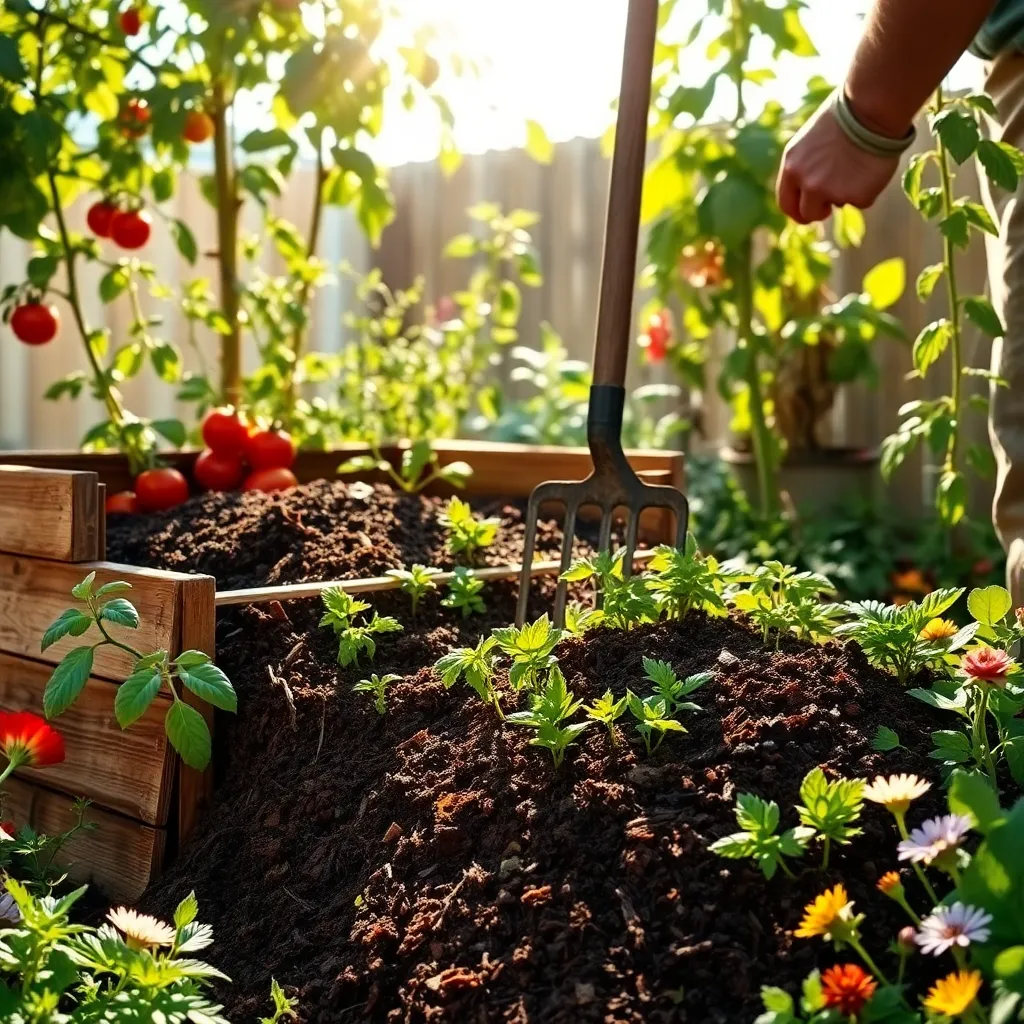
Composting is a fantastic way to improve soil health while reducing kitchen and garden waste. By turning organic materials such as fruit peels, coffee grounds, and grass clippings into compost, you can create a nutrient-rich amendment for your garden soil.
To start composting, choose a spot in your garden that is convenient yet out of the way, where you can place a compost bin or pile. Ensure the location has good drainage and receives partial sunlight to help speed up the decomposition process.
Layering is an essential technique when building your compost pile. Alternate between green materials like vegetable scraps and brown materials such as dried leaves or straw to balance nitrogen and carbon content, which aids in efficient decomposition.
Keep your compost pile moist but not soggy, similar to a damp sponge. Turn the pile every few weeks with a pitchfork or shovel to aerate it, which helps speed up the breakdown of materials and prevents odors.
For those with limited space, consider using a compost tumbler, which is a compact and efficient way to produce compost. With regular turning and monitoring, you can have usable compost in as little as two months, providing a quick boost to your garden’s soil health.
Water Conservation Techniques
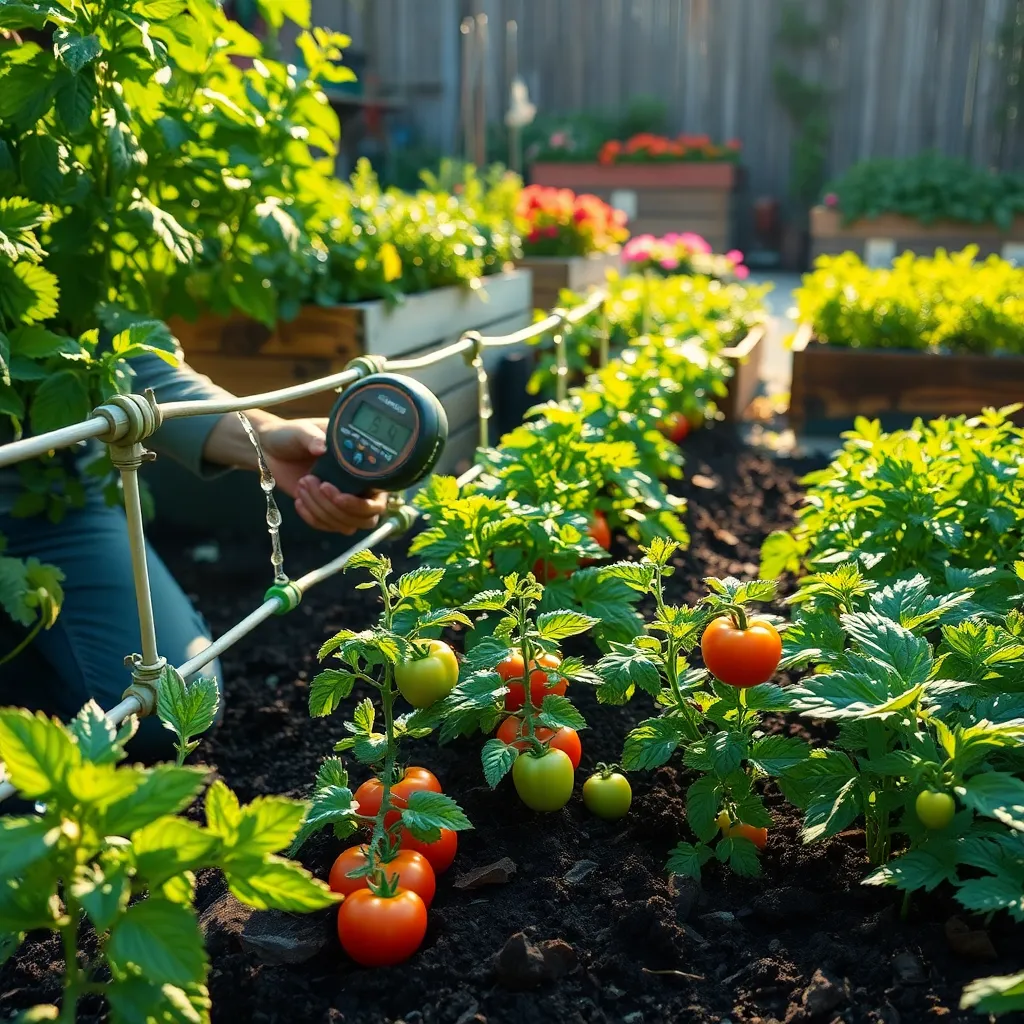
Water conservation is a vital aspect of eco-friendly gardening that benefits both the environment and your wallet. By implementing a few simple techniques, you can significantly reduce water usage while maintaining a thriving garden.
First, consider installing a rain barrel to collect rainwater from your roof. This harvested water can be used during dry spells, ensuring your plants remain hydrated without relying on municipal water.
Mulching is another effective technique that conserves water by reducing evaporation from the soil surface. Organic mulches such as bark chips or straw not only preserve moisture but also improve soil health as they decompose.
For those looking to maximize efficiency, investing in a drip irrigation system can be a game changer. These systems deliver water directly to the plant roots, minimizing water waste and promoting deeper root growth.
To further enhance water conservation, choose drought-tolerant plants that thrive in your local climate. Native plants are particularly adapted to your area’s natural rainfall patterns, reducing the need for supplemental watering.
Finally, consider grouping plants with similar water needs together. This approach allows for more targeted watering and ensures each plant receives the appropriate amount of moisture it requires.
Native Plants for Biodiversity
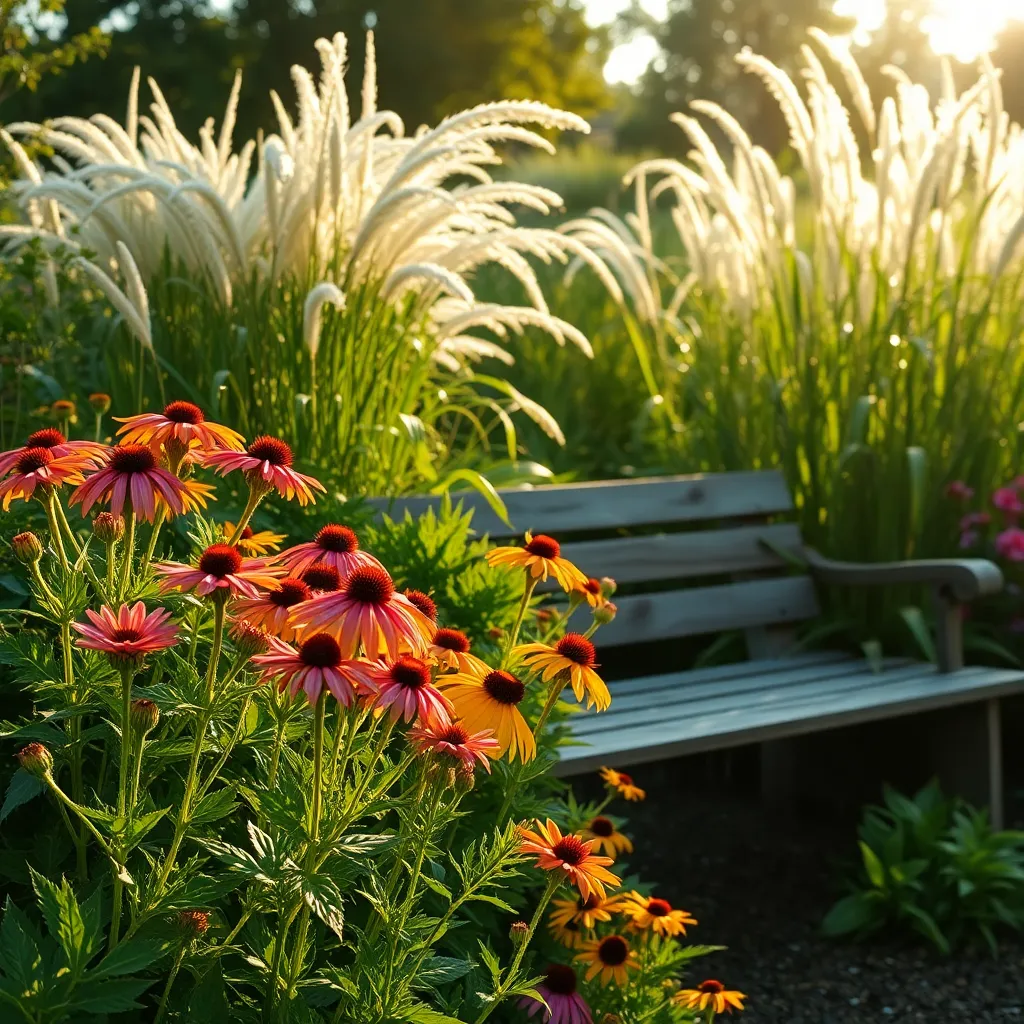
Embracing native plants in your garden is a fantastic way to boost local biodiversity. These plants are well-adapted to the local climate and soil, requiring less maintenance and fewer resources than non-native species.
When selecting native plants, it’s crucial to consider the specific conditions of your garden. Choose plants that thrive in your soil type, whether it be sandy, clay, or loamy, to ensure they flourish with minimal intervention.
Native plants often attract a variety of beneficial insects and pollinators, which can enhance the health of your entire garden ecosystem. For example, planting native milkweed can support monarch butterfly populations, while coneflowers can attract bees and hummingbirds.
For beginners, start with easy-to-grow natives like Black-eyed Susans or Purple Coneflowers. These plants are not only attractive but also drought-tolerant, making them ideal for water conservation efforts.
Advanced gardeners can experiment with creating a layered planting design using native shrubs, perennials, and groundcovers. This approach mimics natural ecosystems, promoting greater resilience and biodiversity within your garden space.
Organic Pest Control Methods
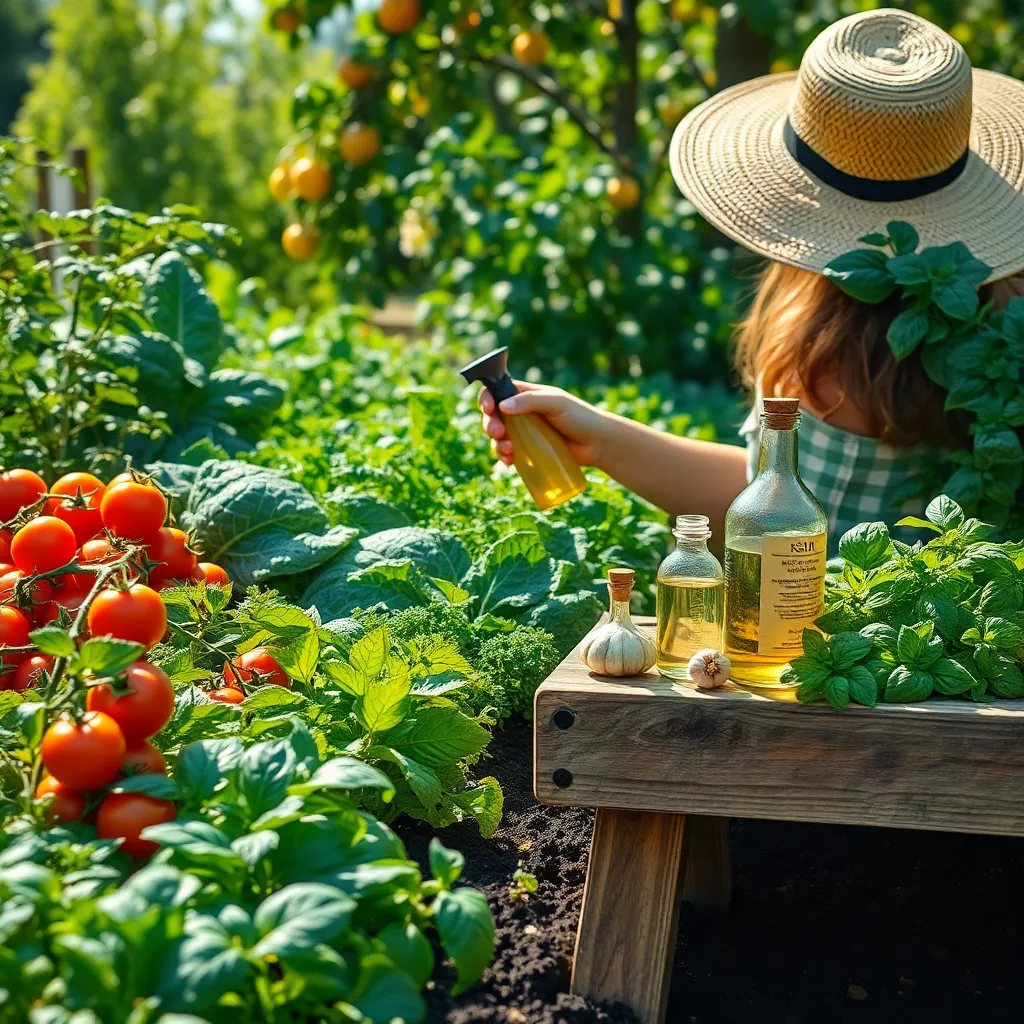
Organic pest control is an essential component of eco-friendly gardening, ensuring your plants thrive without harmful chemicals. One effective method is introducing beneficial insects, such as ladybugs and lacewings, which naturally prey on common garden pests like aphids and mites.
Another strategy involves using natural repellents made from ingredients like neem oil or garlic, which deter pests without affecting plant growth. Neem oil can be mixed with water and a few drops of dish soap to create a homemade spray, applied weekly to keep insects at bay.
Companion planting is also a powerful organic technique that leverages plant relationships to reduce pest problems. For instance, planting marigolds near vegetables can repel nematodes, while basil planted alongside tomatoes can deter flies and mosquitoes.
Advanced gardeners might explore creating a balanced ecosystem by attracting birds and creating habitats for predatory insects. Placing birdhouses and providing a water source can encourage birds to visit your garden, where they will help control insect populations naturally.
Conclusion: Growing Success with These Plants
As we’ve explored, integrating eco-friendly gardening practices into your home life can deepen relationships with both nature and loved ones. First, understanding the importance of communication parallels the need to observe and listen to your garden’s needs. Second, collaboration enhances your efforts, much like when you involve family in sustainable gardening projects. Third, patience is essential both in nurturing plants and cultivating strong bonds. Fourth, the practice of giving, such as sharing home-grown produce, strengthens connections. Finally, consistency in both gardening and relationships yields lasting rewards.
To begin this enriching journey, consider starting a small composting project together. This simple step not only benefits your garden but also provides an opportunity to work as a team, fostering a sense of unity.
Save or bookmark this article as a handy guide to revisit these insights and sustain your commitment to both eco-friendly gardening and relationship growth. Embracing these practices not only enriches your home but also cultivates a future where your relationships, much like your garden, flourish with vibrant life. Remember, every small action you take today plants the seeds for a healthier and happier tomorrow.

